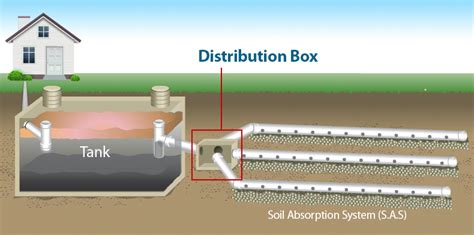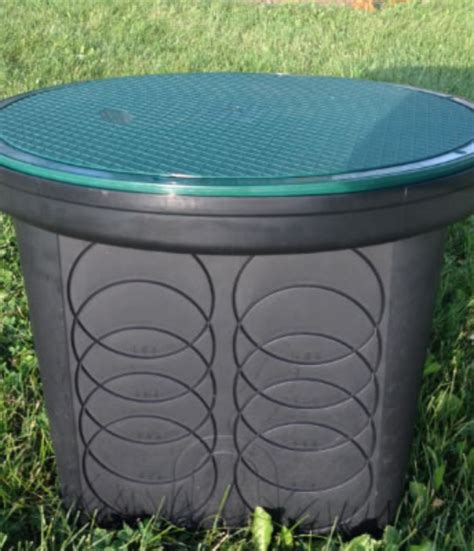distribution box for septic system The distribution box is a small box that comes after the septic tank but before the drain field. They're usually made of either plastic or concrete, and they have several openings on different sides where the drain field lines . The most common size screw to use in an electric box is a 6-32 flathead screw. For heavier applications, like ceiling lighting and ceiling fans, an 8-32 screw will work better. Ground screws in electrical boxes are always 10-32 and must be painted visibly green.
0 · septic system distribution box location
1 · septic distribution box near me
2 · replacing septic distribution box
3 · locating septic distribution box
4 · installing a septic distribution box
5 · concrete distribution box near me
6 · 6 outlet distribution box septic
7 · 5 outlet septic distribution box
$151.46
septic system distribution box location
is k-1 box 19a distribution taxable
septic distribution box near me
A septic distribution box, also known as a D-box, is a crucial component of a septic system. Its primary function is to receive the effluent (wastewater) from .Shea Concrete Products offers precast septic distribution boxes with different outlet options for even wastewater distribution. Learn how to monitor and .A septic D-box or distribution box is a container that connects septic effluent pipes and routes them to the drainfield. Learn how to find, install, inspect, test and fix a s.
The distribution box is a small box that comes after the septic tank but before the drain field. They're usually made of either plastic or concrete, and they have several openings on different sides where the drain field lines . So, what is a septic tank distribution box? It’s a separate underground box that receives the treated sewage from your settling chamber and distributes it to your leach field. In this article series about septic system drop boxes we describe the best procedures for locating and inspecting, repairing or replacing the septic drainfield distribution box, or the "D-box" or "Splitter box".

Septic tank distribution boxes, also known as D-boxes, are a crucial component of any septic system installation. This comprehensive guide will explain what they are, how they work, why proper distribution is important, signs of a failing D-box, and steps for inspection, maintenance, and replacement.A septic distribution box, also known as a D-box, is a crucial component of a septic system. Its primary function is to receive the effluent (wastewater) from the septic holding tank and evenly distribute it to the various distribution lines within the drain field or leach field.
irwin sheet metal pliers
A septic distribution box is required for proper drainage and management of waste in a septic system. Our concrete septic distribution boxes do the trick!Definition of a Septic D-Box: a septic distribution box is a container used to receive septic system effluent from a septic tank and to re-distribute the effluent into a network of attached drain-field or soakaway bed absorption trenches & pipes. The distribution box is a small box that comes after the septic tank but before the drain field. They're usually made of either plastic or concrete, and they have several openings on different sides where the drain field lines connect to the box. So, what is a septic tank distribution box? It’s a separate underground box that receives the treated sewage from your settling chamber and distributes it to your leach field.

In this article series about septic system drop boxes we describe the best procedures for locating and inspecting, repairing or replacing the septic drainfield distribution box, or the "D-box" or "Splitter box".The Septic Tank Distribution Box (DTB) is a critical component within a septic system, responsible for ensuring efficient wastewater distribution and maintaining the system’s functionality. Understanding its purpose, installation requirements, and maintenance costs is . What Is A Septic Tank Distribution Box? Your septic system’s concrete distribution box is a critical component that might not cross your mind until issues arise. Whether you're facing slow drains or unexpected yard pools, understanding and maintaining this key piece can save you from these all-too-common headaches.
A septic tank’s distribution box (or D-box) is a container (typically concrete) that receives the septic tank effluent and re-distributes it into the network of attached drain fields and pipes. To put it simply, its job is to evenly distribute the wastewater into the leach field.
Septic tank distribution boxes, also known as D-boxes, are a crucial component of any septic system installation. This comprehensive guide will explain what they are, how they work, why proper distribution is important, signs of a failing D-box, and steps for inspection, maintenance, and replacement.
A septic distribution box, also known as a D-box, is a crucial component of a septic system. Its primary function is to receive the effluent (wastewater) from the septic holding tank and evenly distribute it to the various distribution lines within the drain field or leach field.
A septic distribution box is required for proper drainage and management of waste in a septic system. Our concrete septic distribution boxes do the trick!
Definition of a Septic D-Box: a septic distribution box is a container used to receive septic system effluent from a septic tank and to re-distribute the effluent into a network of attached drain-field or soakaway bed absorption trenches & pipes. The distribution box is a small box that comes after the septic tank but before the drain field. They're usually made of either plastic or concrete, and they have several openings on different sides where the drain field lines connect to the box. So, what is a septic tank distribution box? It’s a separate underground box that receives the treated sewage from your settling chamber and distributes it to your leach field. In this article series about septic system drop boxes we describe the best procedures for locating and inspecting, repairing or replacing the septic drainfield distribution box, or the "D-box" or "Splitter box".
The Septic Tank Distribution Box (DTB) is a critical component within a septic system, responsible for ensuring efficient wastewater distribution and maintaining the system’s functionality. Understanding its purpose, installation requirements, and maintenance costs is .
What Is A Septic Tank Distribution Box? Your septic system’s concrete distribution box is a critical component that might not cross your mind until issues arise. Whether you're facing slow drains or unexpected yard pools, understanding and maintaining this key piece can save you from these all-too-common headaches.

It originated between the 18th and 19th centuries in the United States, particularly among the German-American farming communities in Pennsylvania. Initially, these stars were painted directly onto barns for their aesthetic appeal and were later handcrafted from metal or .
distribution box for septic system|replacing septic distribution box